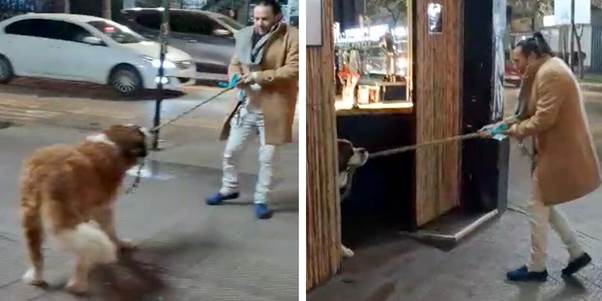Leo didn’t just share his life with Poppy; he trusted her with it. She was a seven-year-old Golden Retriever, a certified guide dog, and in her profession, she was nothing short of a genius. To the outside world, when the stiff, U-shaped handle of her harness was in his grip, Poppy was a picture of unflappable focus: tail down, head straight, ears tuned only to Leo’s precise commands and the ambient auditory map of their busy urban environment.
She could navigate construction scaffolding with the delicate precision of a surgeon and stop before a flight of steps so smoothly Leo barely felt the shift in momentum. Their partnership was a seamless, trusting ballet—except for one glaring, fluffy, golden-haired anomaly in her otherwise spotless service record.

Poppy was a creature of routine, and she had built a powerful, entirely self-serving routine around The Black Cat pub, a cozy, dimly lit establishment two blocks from their apartment.
The Black Cat was not on Leo’s itinerary. Ever. Leo was a disciplined man; his destinations were the library, the dry cleaner, the bank, or the produce market. Yet, five out of seven days, Poppy’s internal GPS seemed to develop a magnetic pull toward the scent of hops, wood polish, and the promise of a very specific, high-value treat she received from the landlord.
This was not a mistake. This was canine policy creation.
The conflict would always begin innocuously.
“Poppy, forward. We’re going left at the corner, to the library.” Leo’s voice was firm, authoritative, the voice of the handler.
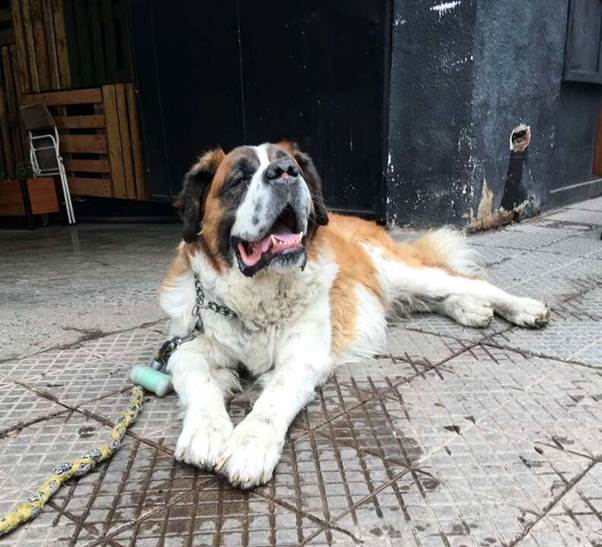
Poppy would start off perfectly, her pace even, her stride purposeful. They would cross the first intersection flawlessly. But as they approached the second street—the one leading directly down to The Black Cat—the tension in the harness would shift. It became less of a steady, guiding pull and more of a gentle, non-negotiable persuasion.
It was the most subtle form of passive resistance imaginable. She wouldn’t stop dead or refuse the command outright. Instead, she’d angle her body slightly, creating a tiny, persistent drag that suggested, with all the nuance of a master negotiator: The straight path, Father, is clearly fraught with peril. We must take the safest route… which happens to be the one that goes past Maureen’s kitchen.
Leo would feel the pull, and his mind would race through the protocols. Was there an overturned dustbin? A sudden pavement crack? A silent electric scooter he couldn’t hear? He’d stop and check the air. Nothing. Just the regular city clamor, and the distinct, delicious aroma of frying onions wafting from the pub.
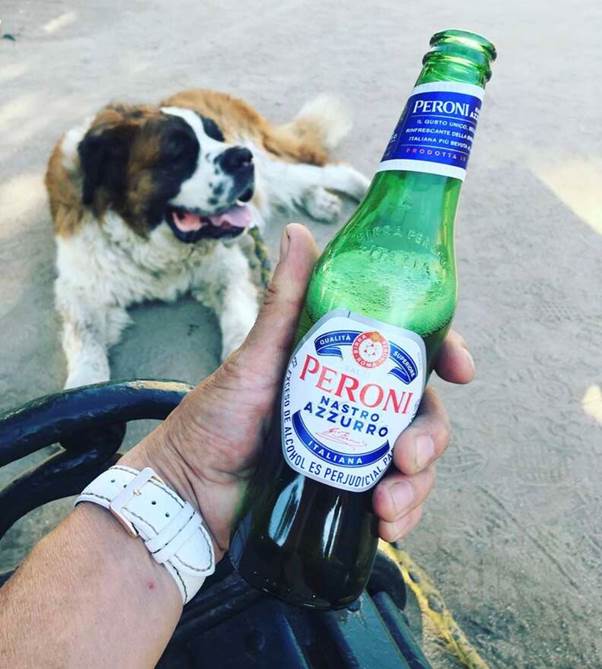
“Poppy, what is it? Obstruction?”
Poppy would look up at him. Her face, a study in feigned professional duty, was beautiful: her golden coat perfectly groomed, her brown eyes earnest and deep. But Leo, who had spent seven years reading every millimeter of her expression, could spot the glimmer of mischief behind the facade. .
If he resisted, she would execute the “Strategic Sit.” She’d drop her large, heavy body onto the pavement, effectively anchoring Leo in place. Her head would remain bowed, the picture of weary obedience, but her tail, tucked neatly under her, would betray a tiny, rapid flutter. It was her way of saying: I have done my due diligence, and I have found the safest current location. This is where we remain until a pint of water and a digestive biscuit are available.
On a crisp Thursday morning, Leo needed to get to the bank quickly to deposit an important cheque.
“Poppy, fast trot. We are going to the Commonwealth Bank,” he commanded, keeping the pace brisk.
Poppy led him expertly through the crowds, dodging commuters and street vendors. They were halfway there when, with a jolt, the harness tightened and pulled hard to the right.
Ah, the pub.
“Poppy! No! Bank! Straight on!” Leo tugged back, a rare show of force.
Poppy dug her claws in. She whined—a soft, theatrical sound of deep distress—and began her relentless pivot towards the pub’s side street. Leo felt the urgency of the bank deposit weighing against the guilt of potentially confusing his vital partner.
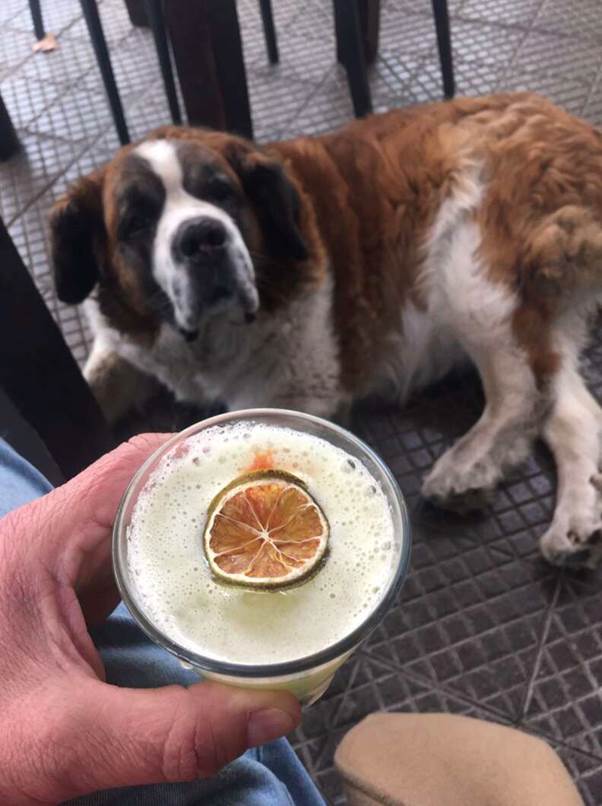
Then, she did the unthinkable. She began to lead him down the center of the side street, completely bypassing the curb-cuts and walking past the row of parked delivery vans that always lined that block.
“Poppy! Boundary! Stick to the pavement!”
But Poppy was resolute. She pulled, she leaned, and she dragged him right to the entrance of The Black Cat. .
Leo sighed in defeat, the sound a mixture of exasperation and weary affection. “Fine, you win, you bad influence.”
Inside, the light was warm, the air thick with the smell of old leather and wood. Maureen, the owner, heard the familiar click-clack of Poppy’s paws on the tiled entrance and called out before Leo could speak, “Poppy! You look stressed! Table by the fire, dear. The usual?”
Poppy, instantly switching from professional escort to beloved patron, gave a quiet ‘huff’ of satisfied victory and steered Leo straight to their corner booth.
The Black Cat was Poppy’s true sanctuary. She didn’t seek the food scraps (she was too well-fed for that), but the social currency of the place. Maureen would always bring Leo his coffee and Poppy a bowl of fresh, iced water and her special treat—a homemade, liver-flavored biscuit that was the currency of the entire operation.
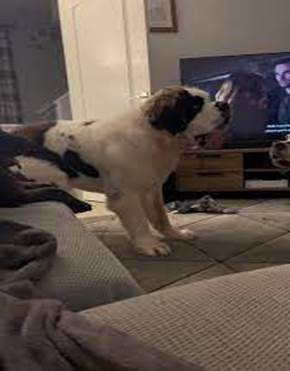
Leo would sit, his important bank errand momentarily forgotten, running his fingers through the soft fur on Poppy’s neck. He watched her as she lay stretched out on the cool tile, head resting heavily on her paws, looking utterly content. She wasn’t just resting; she was absorbing the warmth, the safety, and the attention. She would receive a dozen gentle pats from passing regulars—an exchange of positive energy that she seemed to collect like precious currency. .
One day, Leo talked to Maureen about the problem. “She’s supposed to take me to the bank, and she leads me here every time. She’s a terrible influence.”
Maureen, wiping down the bar, chuckled. “Leo, dear, she’s not a bad influence; she’s a good manager of morale. You rush, rush, rush. She knows you need a pause, and she knows where the best biscuit is. What’s a better service than that?”

Leo had to admit she had a point. In his haste and focus, he often forgot to simply be. Poppy enforced the necessary break, the mandatory moment of peace that anchored his busy day.
The breakthrough came months later. They were on the street when Leo commanded the library route. Poppy immediately tried her pub-pivot. This time, Leo simply lowered his body, scratched her behind the ears, and said, “Poppy. We are going to the library, but after, we will absolutely stop at The Black Cat. Promise.”
He felt the tension in the harness melt. Poppy gave a single, focused pull straight ahead, ignoring the pub street entirely. It was a clear, articulate agreement: she wasn’t defying him; she was simply ensuring her compensation was confirmed.
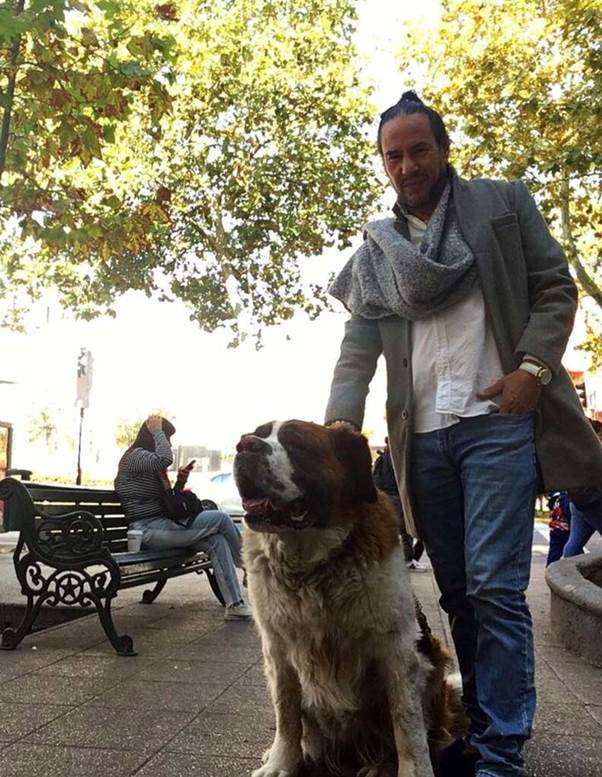
From that day on, their partnership evolved into a perfect negotiation. Sometimes, Leo truly needed the direct route, and a firm promise was enough. Other times, on slow days, he would simply surrender to the inevitable gravitational pull.
“Poppy, surprise me,” he’d say. And inevitably, they’d end up at The Black Cat, where Leo would lift his coffee cup, clink it against her cold water bowl, and toast his beautiful, manipulative, perfectly rogue guide dog. She didn’t just guide him through traffic and obstacles; she guided him through the necessary detours of life, ensuring that in the focus of his busy world, there was always room for a biscuit, a belly rub, and a quiet, comfortable moment of peace at her favorite bar.

